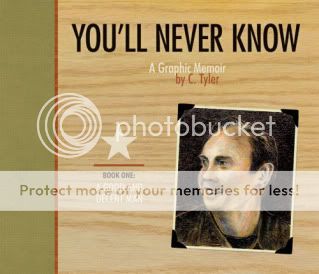
You’ll Never Know Book One: A Good and Decent Man
C. Tyler, writer/artist
Fantagraphics, 2009
104 pages, hardcover
$29.95
You’ll Never Know is a memoir about creating a memoir. In it, the affable but scatterbrained Carol Tyler, buffeted by her separation from her cheating, indecisive husband and by her own memories, finds solace in attempting to construct for her father a scrapbook chronicling his military service during World War II. As becomes clear during a climactic dream sequence in which Hitler proclaims that the trauma inflicted on her father during the War warms his heart from beyond the grave, doing this is much more to Tyler than an attempt to set the historical record straight or satisfy her own curiosity (though it is both of those things as well). It’s the product of a realization that something vital was taken from her father, whom she sees as hard-working, lovably ornery, and an incorrigible cut-up, yet also distant and damaged in a way that suggests a missing puzzle piece she might be able to reconstruct.
Therein lies the problem. So personal is the project to Tyler that in some basic ways it fails to translate to the reader. Her dad, Chuck, is a gruff dude to be sure, but funny and lively. He’s apparently a brilliant handyman, a helluva dancer, he swept the hottest girl in the base’s secretarial pool off her feat, he tears it up at the Pop Hop to which he escorts Carol as a teen, he’s undyingly romantic toward her mother, and most importantly he eventually unloads his previously unspoken military memories for her not once but several times–and yet Tyler insists upon the notion that the horror of his experiences in Italy broke him. It’s just not present in the text. In recounting the plot just now I realized how very similar it is to Art Spiegelman’s experience with his own father in Maus, which is a solid point of comparison–compared to the nightmarish psychological scarring the Holocaust inflicted upon Spiegelman’s parents, and how painfully Spiegelman evokes it, what Tyler’s up to in her depiction of her father remains obtuse.
Tyler’s confidence in the face of this lacuna is reflected in her buoyant but ramshackle art. Her comics’ landscape layout and dashed-off line and lettering (complete with blue-pencil guidelines) evoke a mid-tier slice-of-life webcomic; they’re pleasant and likeable, but they make this very serious and personal project feel slightly airy and inconsequential. They’re not helped in this regard by their presentation as a supplement to the actual scrapbook she’s putting together for her father, nor by her presentation of herself in an always slightly humorous fashion even when literally prostrated by her husband’s infidelity and departure. Transitions and juxtapositions, too, feel under-considered, from the cuts to and from her own life story to this volume’s abrupt cut-off point. I’m not saying her familial war story needs to be the unrelenting legacy of horror that was Maus–their experience was and is different and so should be Tyler’s book about it. But the effect of her writing and drawing serves to cut the tale’s gravitas off at the knees. I know it’s a story she needed to tell; I’m not convinced it’s a story that needed to be told, or perhaps more to the point, that I needed to hear.
Tags: comics, comics reviews, Comics Time, reviews

Pingback: Secret scars of the Greatest Generation: Carol Tyler on You’ll Never Know | Robot 6 @ Comic Book Resources – Covering Comic Book News and Entertainment